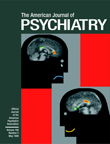No Evidence for an Association of Polymorphisms of the Tryptophan Hydroxylase Gene With Affective Disorders or Attempted Suicide Among Japanese Patients
Abstract
OBJECTIVE: Tryptophan hydroxylase is the rate-limiting enzyme in the biosynthesis of serotonin. The authors examined whether polymorphisms A218C and A779C in intron 7 of the tryptophan hydroxylase gene are associated with a risk for affective disorders or suicidal behavior. METHOD: Subjects were 141 patients with bipolar disorder and 73 patients with unipolar affective disorder, 46 of whom had a history of attempted suicide, and 208 healthy volunteers. All subjects were unrelated to each other, and all were Japanese. Genotyping was performed by polymerase chain reaction amplification followed by digestion by a restriction enzyme and single-strand conformational polymorphism analysis. RESULTS: There was no significant genotypic or allelic association of the A218C polymorphism with bipolar disorder, unipolar depression, or history of attempted suicide. In nearly 100% of the subjects, genotypes for the A779C were identical to those for the A218C. CONCLUSIONS: The authors conclude that the examined polymorphisms are unlikely to have major relevance to the pathogenesis of affective disorders or suicidal behavior.



